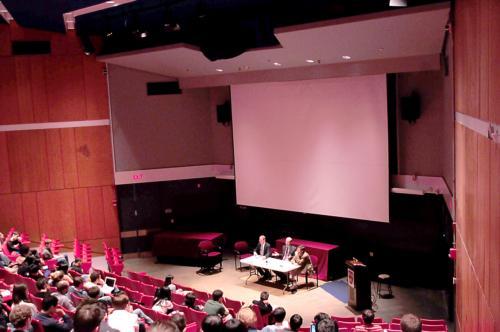
News
Summers Will Not Finish Semester of Teaching as Harvard Investigates Epstein Ties

News
Harvard College Students Report Favoring Divestment from Israel in HUA Survey

News
‘He Should Resign’: Harvard Undergrads Take Hard Line Against Summers Over Epstein Scandal

News
Harvard To Launch New Investigation Into Epstein’s Ties to Summers, Other University Affiliates

News
Harvard Students To Vote on Divestment From Israel in Inaugural HUA Election Survey
Panel Discusses Market Slump

While American politicians are embroiled in debates over the degree of the U.S. economic crisis, Harvard economics professor Kenneth S. Rogoff told a lecture hall of undergraduates that the current financial crisis “looks like a really bad one.”
The event—“The Current Economic Slowdown: Causes and Consequences”—was hosted by the Harvard economics department and intended to explore the recent downturn with “no Harvard politics, just real-world substance,” department chair and moderator James H. Stock wrote in an e-mail.
The panel featured Rogoff, an economics professor and former research economist for the International Monetary Fund, and John Y. Campbell, an economics professor and expert on capital markets.
The panelists expressed pessimistic views about the economy’s current situation, as well as worries about the future.
“We would be really lucky if this [downturn] were not as bad as 2001,” Rogoff said. “If you look at the run-up to this crisis...there were a lot of red lights blinking.”
Campbell took a slightly rosier view toward the short term, saying there were some “good things” happening on that horizon, but was fearful for the long run.
“Banks have become very reluctant to lend to each other, which has caused a crisis of confidence in the financial system,” he said. “The reason people are so alarmed...is we’re quite uncertain how these financial problems are going to play out and how they’ll affect the larger economy.”
Stock cut in briefly to convey his more optimistic views, saying that recent employment data and the stimulus package approved by Congress in February “suggest a more positive outlook.”
None of the economists offered a solution to the current problem, and Rogoff was jokingly contrite about not having predicted the crisis.
“If I had seen it coming,” he said, “I would have shorted subprime debt, if I knew how to do that.”
—Staff writer Maxwell L. Child can be reached at mchild@fas.harvard.edu.
Want to keep up with breaking news? Subscribe to our email newsletter.
